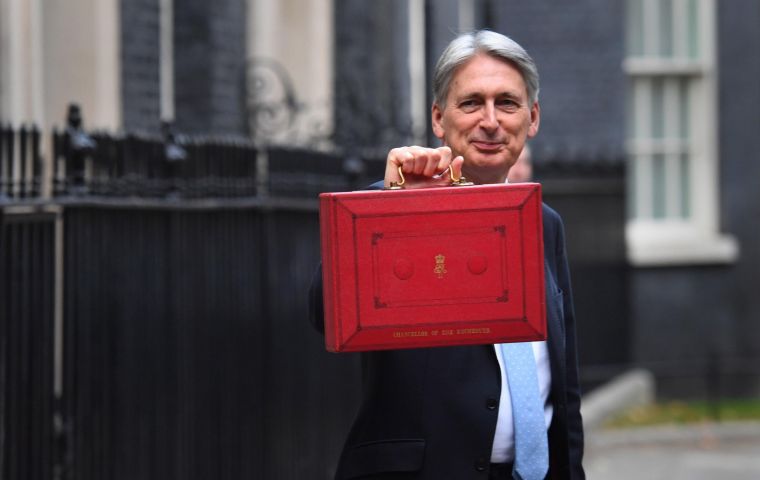MercoPress. South Atlantic News Agency
Institute for Fiscal Studies says more billions needed to end Hammond's austerity
 In its analysis, IFS said spending increases already promised by Hammond would be swallowed up by commitments to fund the NHS, defense and international aid
In its analysis, IFS said spending increases already promised by Hammond would be swallowed up by commitments to fund the NHS, defense and international aid Philip Hammond must spend billions extra to end austerity, says think tank the Institute for Fiscal Studies (IFS). To maintain per capita spending across government departments which don't have ring-fenced budgets, he must find an extra £5bn a year by 2023, it adds. And maintaining spending on unprotected services as a share of national income would require £11bn on top of spending plans set out in the 2018 Budget.
The Treasury says long-term funding decisions will be made later this year.
In its analysis the IFS said spending increases already promised by the chancellor would be swallowed up by commitments to fund the NHS, defense and international aid. And that could mean cuts in other areas it added.
“The provisional totals set out in the Autumn Budget imply that day-to-day public service spending will increase by 6.1% - £18.2bn - between 2018-19 and 2023-24,” the IFS report said.
“This would outstrip population growth, putting per capita spending on an upward trend. But this would not be enough to meet the cost of the government's existing spending commitments on the NHS, defense and overseas aid while avoiding cuts elsewhere.”
But a Treasury spokesman said public investment would hit peaks not seen since 1979. “The chancellor has said that the Spending Review will take place in 2019, and that is the right moment for government to make long term funding decisions,” they said.
“We have made clear that health is our number one spending priority by announcing a five-year settlement which will provide an extra £34bn a year for the NHS by 2023-24.
”Outside the NHS, total day-to-day departmental spending is now set to grow in line with inflation, and public investment will reach levels not sustained in 40 years in this parliament. “
Meanwhile, the IFS said a no-deal Brexit would mean lower growth, requiring either spending cuts or higher taxes. And it said in the short term the government might need to borrow more to fund a stimulus package to mitigate the impacts for the hardest-hit areas of the economy.
But the IFS said any spending boost to spending would be temporary, and more austerity would eventually be required.
Ben Zaranko, a research economist at the Institute for Fiscal Studies and an author of the report, said there could be more years of austerity for many public services. But he said it would be at a much slower pace than the last nine years.
”And while an economically bad Brexit would likely mean lower spending in the longer term, if anything it might require additional spending over the next few years.“
Shadow Chancellor John McDonnell said: ”The evidence is mounting that despite Theresa May's rhetoric, austerity is not over. Unless Philip Hammond, at the very least, finds another £5bn at the Spring Statement, departments will be planning for yet more cuts next year.
“Nine years of brutal Tory austerity have wounded our public services and the whole country which relies on them.”




Top Comments
Disclaimer & comment rulesCommenting for this story is now closed.
If you have a Facebook account, become a fan and comment on our Facebook Page!